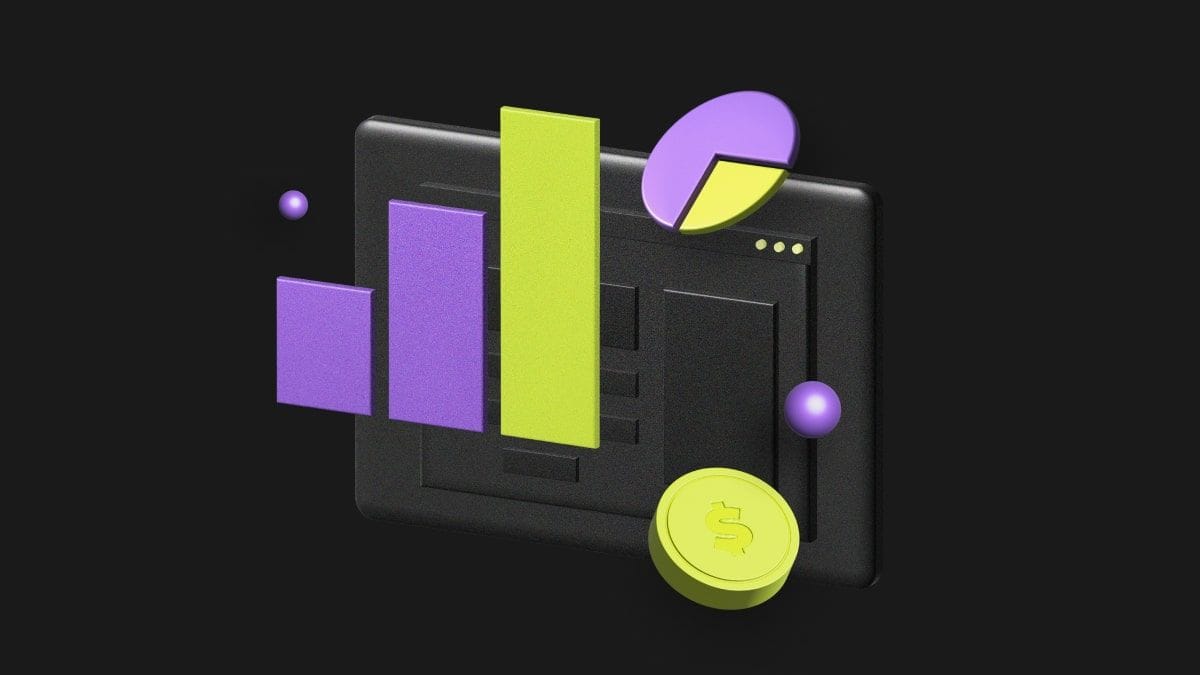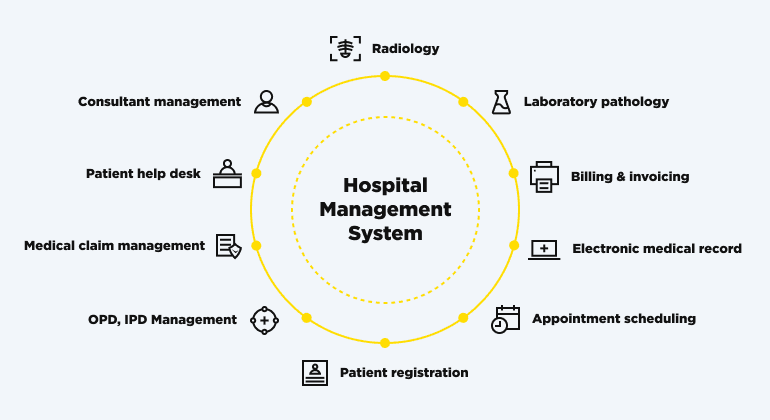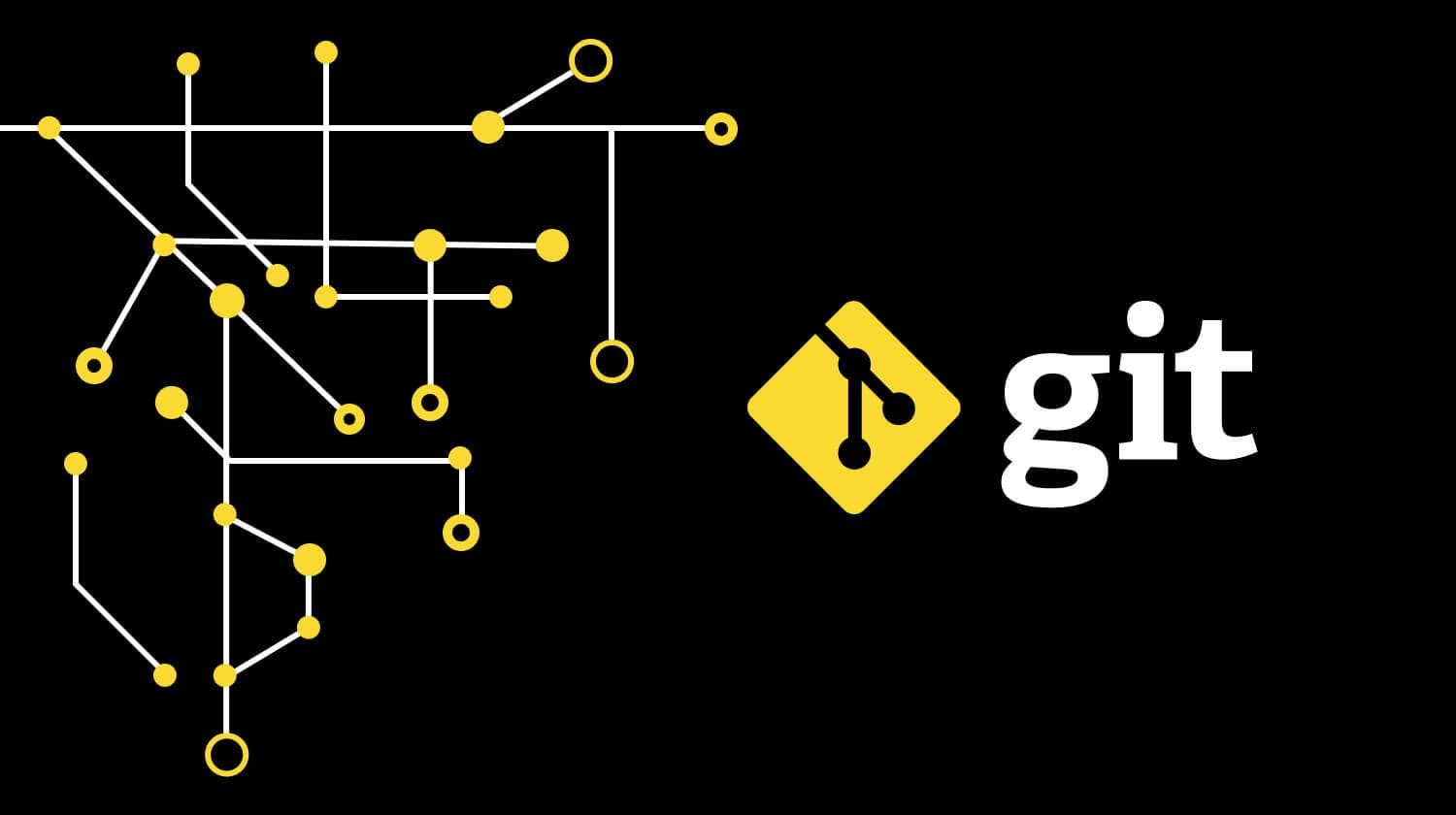Modern society is going digital by bringing tons of ahead-of-curve solutions for various industries and businesses. Since the COVID-19 pandemic, we’ve witnessed a significant rise in digitalizing learning and training students and employees. In 2020, 70% of L&D departments in North America used the LMS system for employee training.
The healthcare industry requires a constant update of knowledge to keep medical professionals competent and skillful enough. With the whole medical care sector transforming and embracing new digital solutions, hospital learning management systems are the must-have tool for healthcare organizations, clinics, and medical facilities to increase patient satisfaction.
Read on to discover whether one should invest in the LMS for healthcare, the common advantages of such a system, and how you can develop one!
What is LMS for Healthcare?
A healthcare learning management system (LMS) is a digital platform that provides medical care organizations, doctor offices, and clinics with tools for creating, delivering, and tracking educational content for healthcare professionals, including clinicians and administrators. In simple words, it’s a unique online pocket-size school that includes theoretical classes, online training, and practical exercises. LMS’s goal is to provide training, certification, and continuing education for healthcare staff to keep their knowledge and skills up-to-date.
LMS Solutions: What Healthcare Organization Needs Does It Cover?
For medical facilities, it’s vital to keep staff informed about new changes in regulations and up-to-date with current practices to improve the quality of medical care provided for patients. Therefore, the best LMS for healthcare should tackle four specific pain points for hospitals and other facilities:
- Accessibility of educational and training process at any time and place. Doctors’ and practitioners’ schedules are pretty challenging to combine with regular classes. LMS is a flexible platform that allows access to medical training and exams on individual terms.
- Constant availability of educational content. Healthcare LMS contains a cloud database of valuable studying materials, from PDF textbooks to podcasts and video lectures.
- Minimizing the in-person education demand. Medicine learning system saves time, finances, and energy by providing online education and the ability to train several users simultaneously.
- Newest materials according to the market developments. The number one goal of the LMS tool is to keep medical professionals up-to-date with new trends, learn new skills, and discover new ways to provide excellent care for patients.
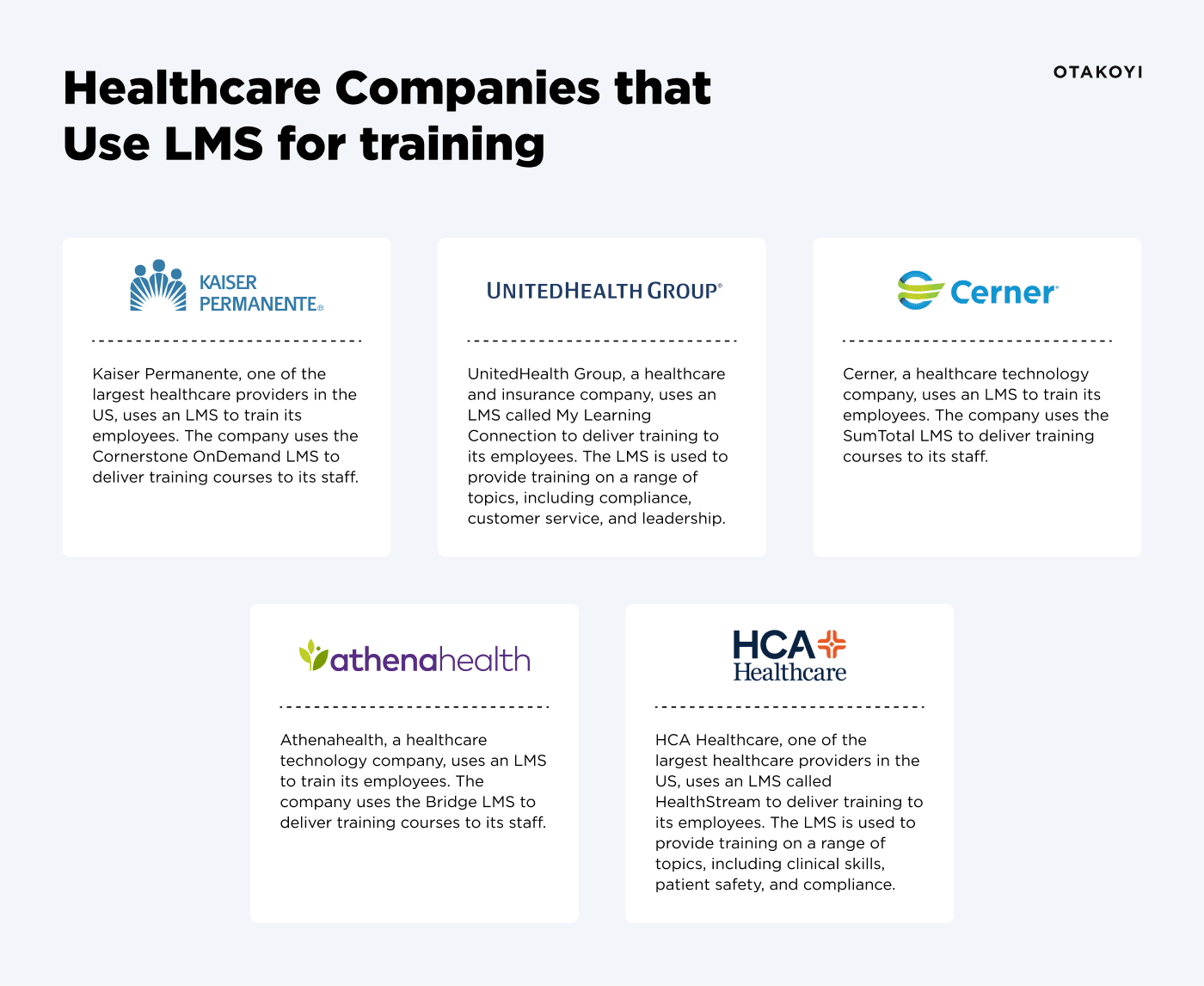
Why Should You Invest in the LMS for the Healthcare Business?
Let’s say you run a medical organization and wonder if an LMS system is a good investment for your business. The simple answer is “Absolutely”!
The study revealed that in 2021, 84% of companies spent more on an online training program than expected. The digital education provided by the unique LMS system guarantees healthcare business:
- Reduced costs. Spend your budget on more actual implementations instead of wasting it on classrooms, paid instructors, and printed-out study materials. LMS provides all necessities and comfort for a medical student or professional.
- Faster new employee onboarding and adaptation process through LMS software.
- Improved student engagement and boosted motivation to learn by gamification of the educational process.
- Efficient progress tracking and better learning results. Employees and students can organize their studying time and learn more efficiently, leading to improved quality of medical care provided in the facility.
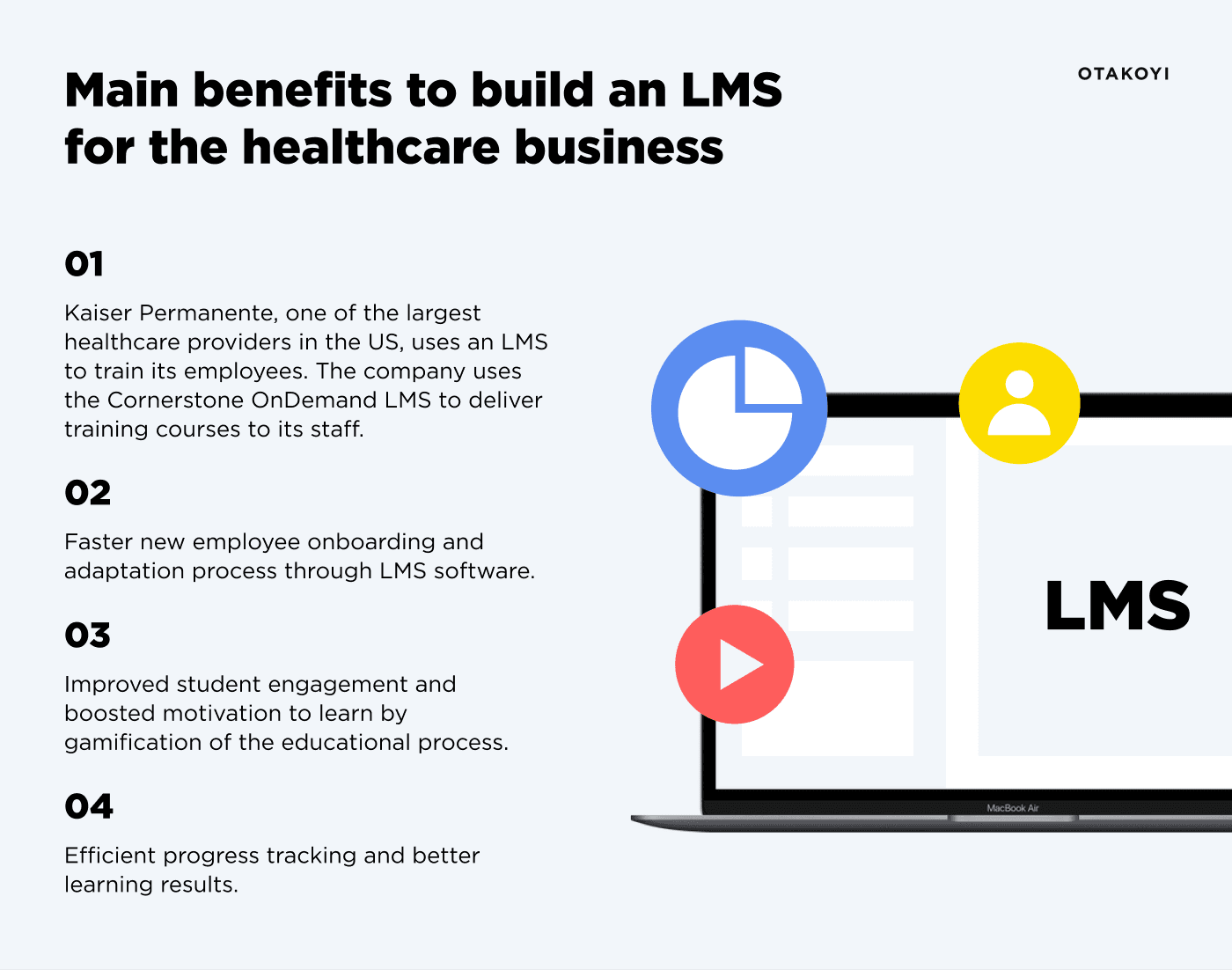
Healthcare LMS Market Outlook
Let’s look at the stats reflecting the immersive rise of LMS solutions in the tech healthcare market.
The Transparency Market research revealed that the healthcare LMS software market will go beyond $3,5 billion by 2030. In other words, the compound annual growth rate (CAGP) is almost 22%.
What drives the demand for online learning platforms for healthcare?
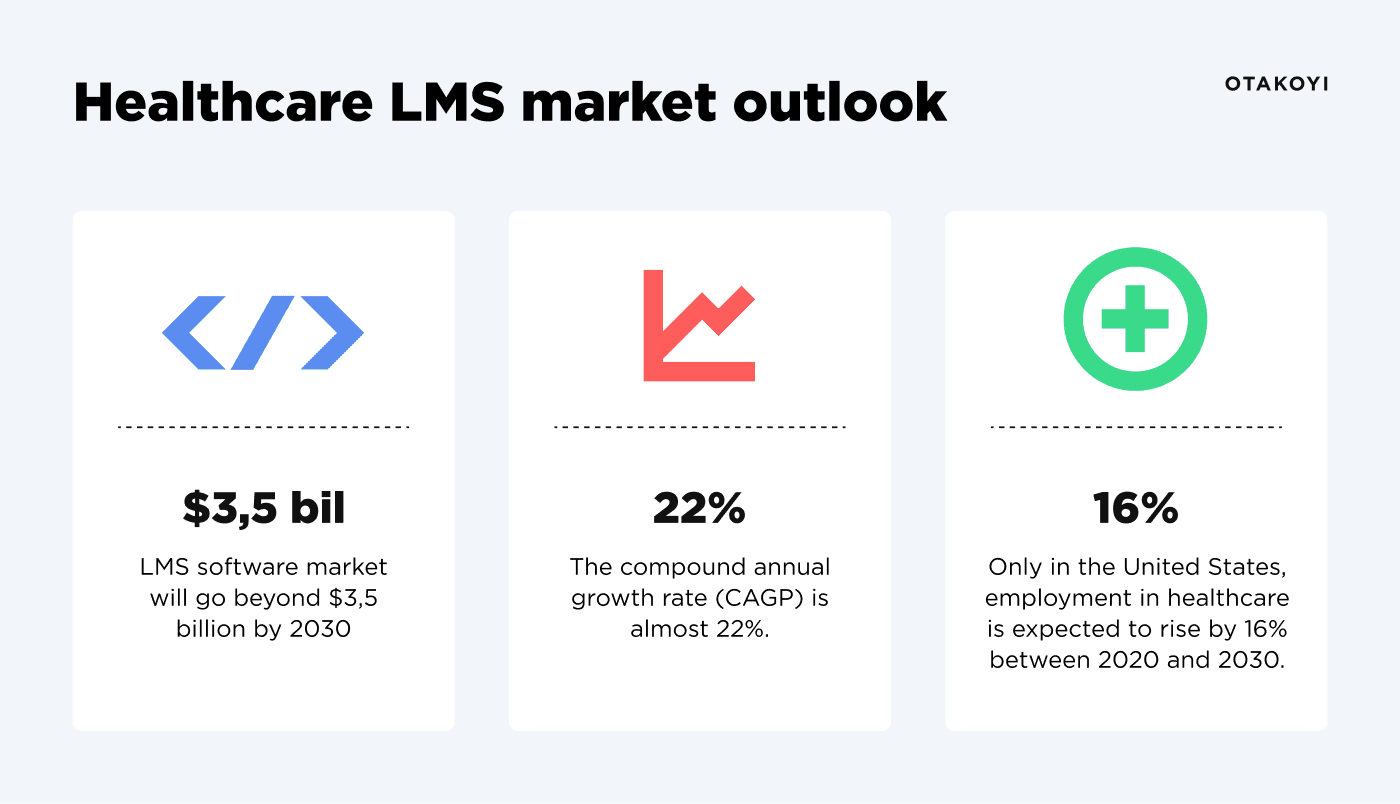
- Global pandemic causing a rise of remote learning solutions;
- Convenience and accessibility of healthcare education with the LMS system;
Doctors and practitioners have to be up-to-date with changing practices and compliance;
Increased interest in healthcare career paths.
Only in the United States is employment in healthcare expected to rise by 16% between 2020 and 2030. Faster than any other industry.
Alongside the growing demand, healthcare LMS benefits for medical associations and facilities are undeniable.
Benefits of Implementing Healthcare LMS Solutions
Implementing a healthcare learning management system benefits the organization significantly and helps medical personnel boost their knowledge and skills.
Improved training effectiveness
A healthcare learning management system offers personalized and interactive learning experiences. It increases employee engagement among medical workers and leads to better knowledge retention. The latest medical training procedures include interactive modules, quizzes, and multimedia content that make learning more appealing and effective. As a result, it ensures that healthcare professionals stay up-to-date with all the improvements. LMS is able to help you tailor the training to individual needs, bridge knowledge gaps, and enhance overall competency in the workforce.
A variety of course types
A healthcare LMS provides a wide range of course types, allowing organizations to create a comprehensive educational system. The main course types include traditional classroom sessions, online courses, blended learning programs, VR and simulators, webinars, and microlearning programs (like compliance training, e.g.). It simplifies the learning process for trainers and trainees, allowing them to host various classes and training sessions on one platform. An LMS provides the flexibility needed to cater to different learning preferences and schedules, ultimately improving the quality of education in your healthcare institution.
Enhanced compliance
It is more than essential to ensure that all medical staff are familiar with crucial policies, procedures, and regulations. A healthcare LMS enhances regulatory compliance by providing consistent and up-to-date training materials. There are automated reminders and tracking features that make sure that all employees complete necessary courses and certifications on time. It helps maintain high standards of practice and reduces the risk of non-compliance, which can lead to legal issues and compromised patient care safety.
Streamlines operations
Automation for healthcare companies is crucial and effective. A healthcare LMS streamlines operations, especially for an administrative team, by automating various tasks related to learning and training. This includes scheduling, tracking progress, and maintaining records. Reducing the manual workload allows healthcare administrators to focus on other critical duties and tasks while automation minimizes errors and ensures that training records are accurate and easily accessible.
Data-driven insights
A healthcare LMS generates valuable data and analytics on student or employee progress and performance. With mobile learning capabilities, managers can access this information anytime and anywhere, allowing for timely and informed decision-making. Analyzing this data helps identify areas where additional training may be needed, track professional development over time, and ensure that the training programs are effective. Altogether, it significantly contributes to continuous improvement.
Enhanced quality and safety
Implementing a healthcare LMS helps standardize care by providing uniform training to all medical staff. It reduces the likelihood of medical errors and enhances the overall quality of patient care. Standardized and customized training ensures that all personnel are equipped with the same knowledge and skills, leading to more consistent and reliable healthcare delivery. Such improved training and compliance directly allow for better patient outcomes and higher safety standards.
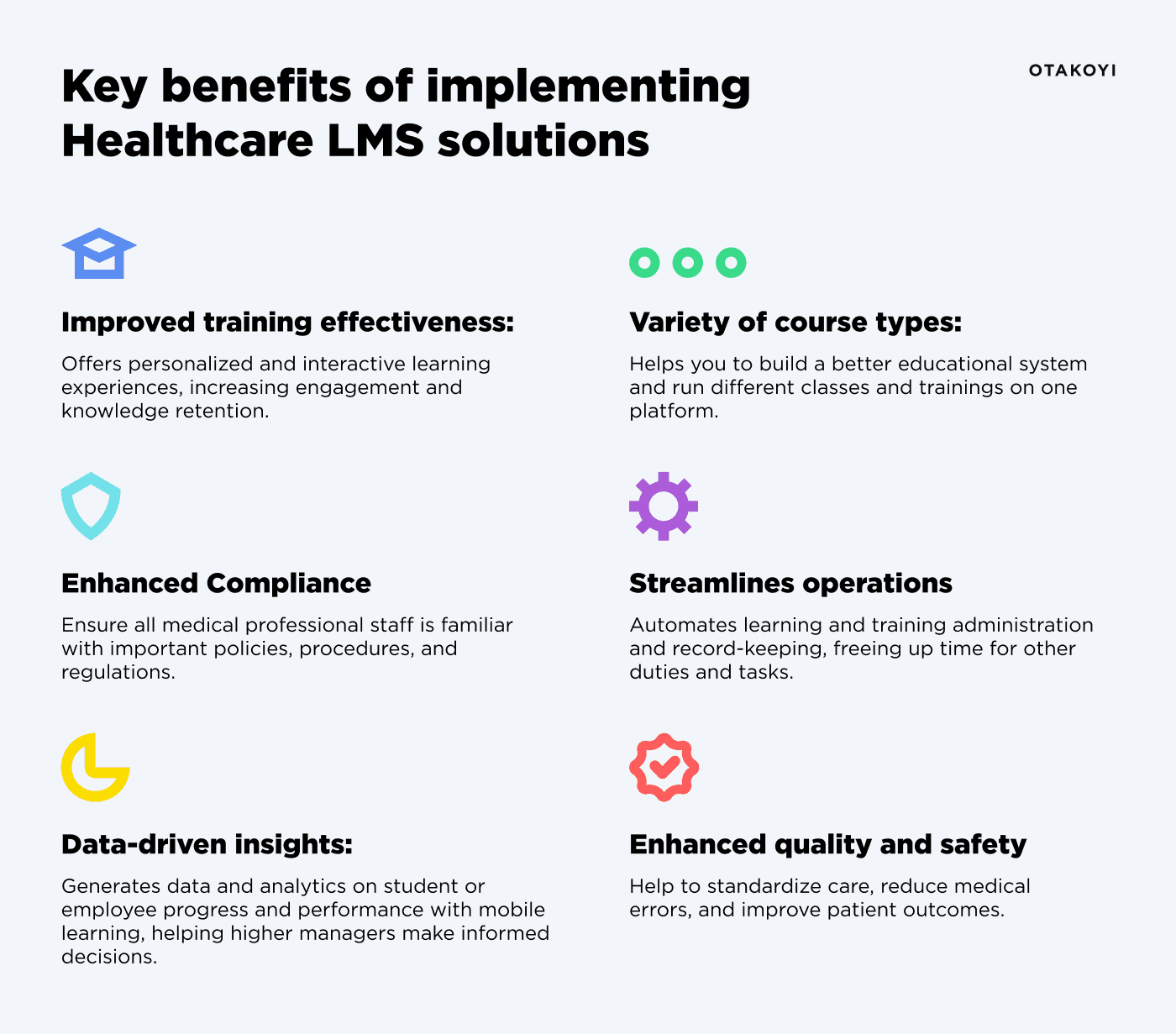
Must-have Healthcare LMS Features
Let us provide you with the list of must-have features LMS for healthcare businesses should have to improve employee skills, provide the newest training material, and guarantee fast learning results.
User and profile management
First and foremost, a healthcare LMS must have robust user and profile management features. What benefits does it bring? It allows administrators to add, update, and manage user accounts and profiles easily. Moreover, you can organize users into specific roles and groups to tailor training to meet the unique needs of different departments and individuals. It helps you control staff turnover, as you can see where all medical employees are involved throughout their development.
Reporting and analytics tools
When we speak about LMS, reporting and analytics tools are essential for monitoring progress and evaluating the effectiveness of training programs. These features provide detailed insights into learner performance, course completion rates, and overall training impact. With these comprehensive reports, administrators can identify areas for improvement, track compliance, and make data-driven decisions to improve training outcomes in future courses.
Mobile compatibility and responsiveness
LMS is a software solution that can’t do without mobile compatibility and responsiveness. You won’t be surprised if we tell you that healthcare professionals often need to access training materials on the go. That’s why they require access to various devices. An LMS that works seamlessly across smartphones, tablets, and desktops ensures that! It is possible to continue their education anytime and anywhere.
Assessment and evaluation tools
Of course, assessment and evaluation tools are vital features of a healthcare LMS. It is crucial not only to track progress but also to estimate the acquired skills and knowledge. What is more, these tools can include quizzes, tests, and practical assessments. All of them provide immediate feedback to learners as well as to administrators. When you regularly assess specific competency standards and the expertise gained, you are able to contribute to maintaining high levels of professional expertise.
Course, materials, and content management
Organizing all the courses with their materials and content management allows administrators to easily create, organize, and update training materials. This way, it is possible to change the resources as the healthcare industry constantly changes so that learners get only up-to-date materials. Moreover, LMS should provide features to support diverse learning formats, including videos, documents, and interactive modules. Healthcare employees get interactive and efficient learning experiences while administrators keep content relevant and engaging.
Personalized learning paths
Healthcare professionals especially require learning materials that cater to their individual needs. This LMS feature allows customized training programs based on specific roles, skill levels, and career goals. This way, an LMS can help employees develop the exact skills they need to excel in their positions. Your healthcare institution benefits from relevant and efficient training, better engagement, and knowledge retention.
Gamification and interactive elements
Gamification and interactive elements have become an integral part of the learning routine. We believe that by incorporating elements such as quizzes, badges, leaderboards, and interactive simulations, an LMS can motivate learners and encourage active participation. Therefore, gamified learning can lead to better outcomes and higher satisfaction among healthcare employees.
Integrations with third parties
Comprehensive healthcare LMS can’t go without integrations with third-party systems. As healthcare itself is complex, so should LMS adapt to its requirements. With this feature, you can integrate your platform with other essential software and platforms, such as HR systems, electronic health records (EHR), compliance tracking tools, etc. It reduces administrative burdens and errors and enhances the overall efficiency of the learning and development process.
Outstanding user experience design
Can anyone doubt the effectiveness of a great UX and UI design? An LMS benefits from it as well. It is intuitive and easy to navigate, making it accessible to all users, regardless of their technical proficiency. Key features of healthcare LMS UX/UI design include clear navigation, visually appealing layouts, and responsive design elements. We are sure that a positive user experience encourages continuous learning.
User support functionality (live chats, help desk, FAQs)
It is likely that users may need to address some issues or questions that they may encounter. Features such as live chats, help desks, and FAQs provide immediate assistance and ensure that learners can resolve problems quickly. As a result, administrators are not always disturbed by various questions, as most of them are covered in the user support section. This way, learners are able to fully utilize the LMS and stay engaged with their training programs.
Creating a Healthcare Learning Management System in 8 Steps
We’re here to break the myth that building an LMS for the healthcare industry is difficult. The secret is to find an LMS vendor you can trust with development and final results. Creating a custom learning management system requires only eight steps.
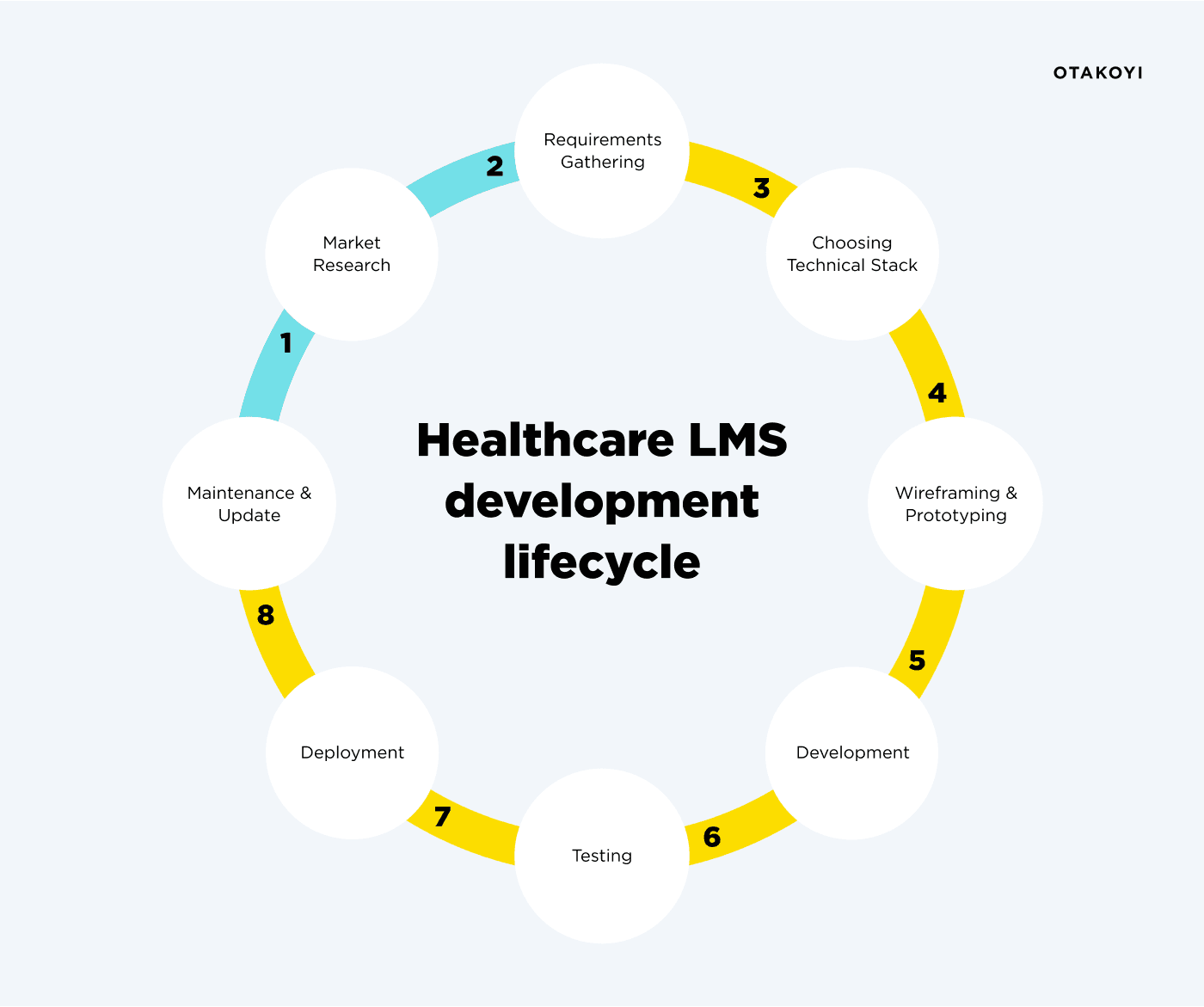
Step 1. Market research
The first and most mandatory step is to understand the day-to-day routine of your healthcare business, its pain points, needs, and specifics. Take your time to conduct thorough research and user interviews, and define a clear idea for an LMS specifically for your business needs.
Step 2. Requirements gathering
As soon as the overall idea is clear, you can start gathering requirements or preparing a Business Requirements Document. This will describe your business processes and flows in detail, with further ability to implement them in your LMS development. The goal of requirements gathering is to define:
- Scope of future work;
- Business goals;
- Specific end-user (medical center, hospital, doctor’s office)
- Possible concerns;
- Required resources.
Step 3. Choosing tech stack
Defining a technical stack as a business-oriented professional is the most complicated step while starting a project development. So here, just make sure you are partnering with a good technological company that will analyze your business needs and recommend the best way out. Based on your requirements, the choice of the technical solution or framework may change drastically. The development team finds the technical solutions to meet the product, business, and compliance requirements.
Step 4. Wireframing and prototyping
This is the step when you finally start designing your business ideas into one logically connected system. At this stage, make sure you are setting a good foundation for your LMS with clear architecture, outstanding UX design, robust performance, and flawless integrations. Based on that, you will be able to create a UI design, which will give you a good understanding of how the system will look after development. The UI designers create a simple and easy-to-navigate LMS interface that doesn’t distract users from the learning process.
Step 5. Development
Based on all the previous steps, develop your LMS into a tangible project! Make sure your developed system is well aligned with the design and the logic you’ve set in the earliest stages.
Step 6. Testing
During the development phase, it’s important to understand that some of the newly developed features may directly impact other components of the system. Without Quality Assurance, it is difficult to track these details and fix them on the fly. Make sure you pay good attention to this stage of the product, as quality testing guarantees you’re launching market-ready healthcare LMS software.
Step 7. Deployment
Finally, you can launch your system and try it yourself in real life! Here is where your journey as a user begins. Try to test it yourself very carefully, as the next step will be all about upgrading your system or even adding new features to that.
Step 8. Maintenance and updates
After you launch your project, do not stop working on it! Many great ideas may come up after you get used to the system and define a space for improvement. As soon as some new needs arise, you can start integrating them into an existing system.

Ready to build an LMS for your business?
Contact usLMS for Healthcare Industry: Development Cost Estimation
The cost of developing LMS systems for healthcare varies widely depending on several factors:
- Project scale (number of users, courses, features, etc.);
- Type of used technology (custom development or open source LMS);
- Development team geographical location;
- Project timeline and budget;
- LMS vendor expertise and experience.
The cost of building a medical LMS from scratch ranges anywhere from $50,000 to $500,000. Implementing an open-source LMS or outsourcing healthcare LMS development to an off-shore company can significantly reduce production costs.
Why Choose LMS Solutions From OTAKOYI?
- Customization and flexibility: OTAKOYI offers tailored LMS solutions to meet the unique needs of healthcare organizations.
- User-Friendly interface: We design LMS solutions with a user-friendly interface that makes it easy for healthcare professionals to access and engage with learning materials.
- Integration with other systems: OTAKOYI’s team can integrate LMS software with other healthcare systems, such as electronic health records (EHRs) and patient management systems, to streamline processes and increase efficiency.
- Mobile responsiveness: We make it possible for healthcare professionals to access learning materials on the go.
- Expertise in healthcare: Our team knows the challenges healthcare organizations face and the importance of compliance, making OTAKOYI a trusted partner to execute your e-learning for a healthcare project.
- Dedicated support: We offer advanced service and support at every step of development, ensuring that any issues are resolved in a timely and effective manner.
- Cost-effective: We offer Eastern European affordable cost charges for outstanding high-quality development and reliable products.
Interesting Facts About LMS for Healthcare
Did you know, that:
- Hiring talented employees can greatly benefit your business, resulting in a 10% boost in productivity, a 20% increase in sales, a 30% rise in profitability, and a 25% reduction in unscheduled absences.
- According to surveys, the majority of educators (77%) believe that online learning is as good as or better than traditional learning. In comparison, nearly 70% of students agree that online instruction is just as good as or better than classroom-based learning.
- A custom LMS can streamline training and document management by storing all materials in one location and allowing for easy access while managing user permissions to ensure confidentiality.
- Implementing an LMS can result in significant cost savings for organizations, reducing expenses associated with trainers, venues, printing, equipment, travel, logistics, and time.
- Successful companies tend to align all their business units with their overall corporate strategy, with 63% of such companies implementing this practice.
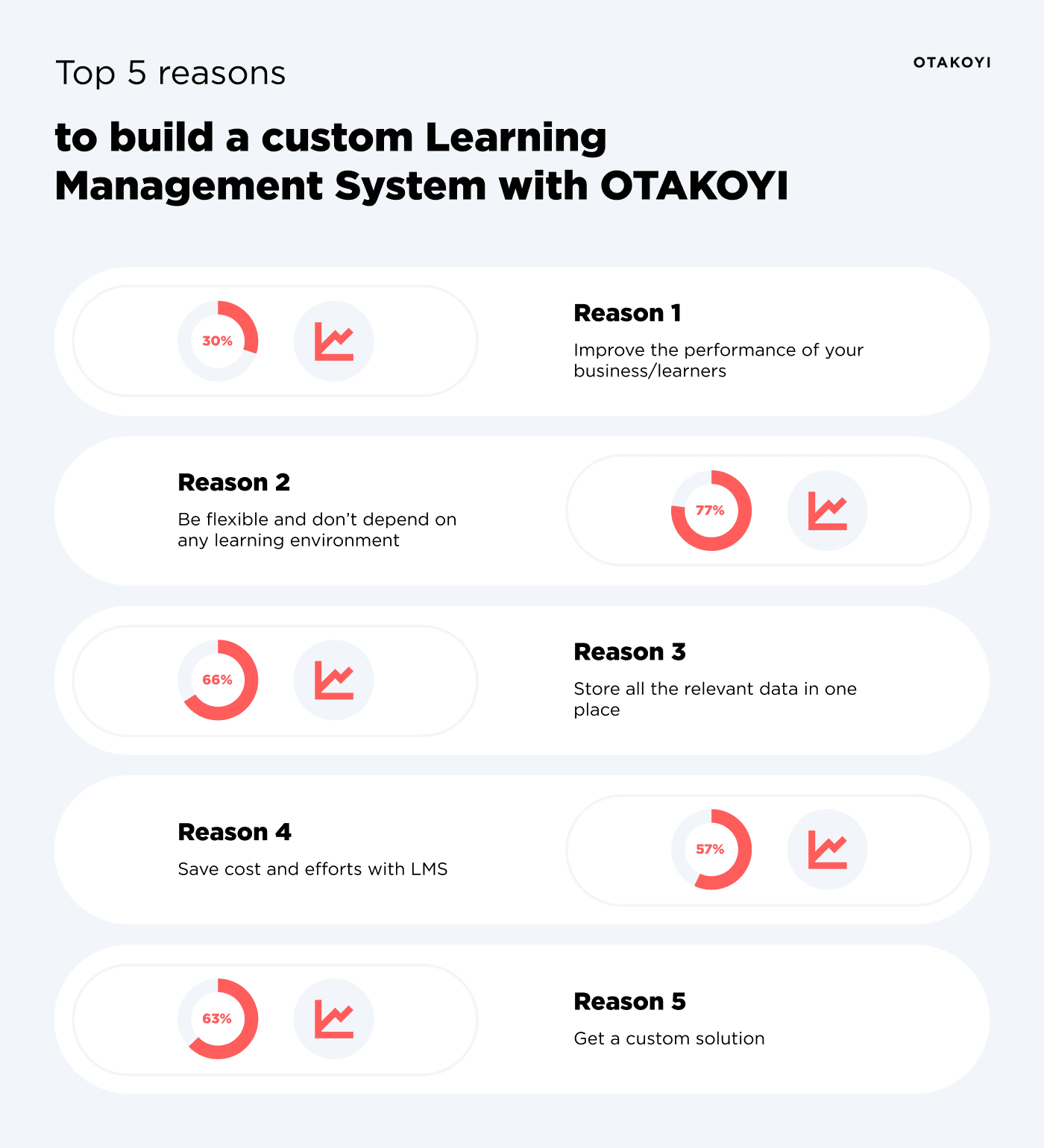
The Bottom Line
Implementing LMS software in healthcare businesses and facilities can engage students and practitioners in the learning process, motivate them for better results, and improve the quality of medical care. LMS solutions elevate the healthcare sector and empower organizations with educated and skilled medical staff by making education accessible, interactive, and compliant with the newest practices and regulations.
